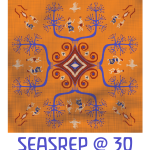SEASREP 30th Anniversary Conference
Southeast Asian Studies:
Ideas, Audiences, Approaches, and Aspirations (SEAS-IA3)
13-14 November 2025
Call for Papers
SEASREP turns 30 in 2025 and invites you to join its celebratory conference at the Thammasat University Rangsit Campus in Pathum Thani, Thailand on 13-14 November 2025, in partnership with the Institute of East Asian Studies of Thammasat University and supported by the Henry Luce Foundation. We want to celebrate friendships and partnerships formed over the years and highlight advances made in studies of the Southeast Asian region. The very idea of Southeast Asian studies being a singular intellectual field, with an established body of foundational texts, approaches, founders, and practices is an overstatement, for it ignores varying epistemological traditions even within national settings and overlooks the ways in which notions of Southeast Asian studies are understood and operationalized in Southeast Asia. Critically, scholars can no longer treat Southeast Asian studies as belonging exclusively to professional scholars while on the ground, practitioners engage and construct ideas in the name of Southeast Asian studies.
Ideas, audiences, approaches, and aspirations are our anniversary themes because we want to:
- Include all sorts of new and exciting studies in the field that deepen our understanding of ourselves and how we relate to one another in numerous, different ways;
- Broaden the reach of Southeast Asian studies by focusing on the scholars, readers, consumers and, borrowing from Na Li (2023: 43-52), “prosumers” of Southeast Asian studies;
- Examine, from different perspectives, established and creative, innovative approaches to studies of Southeast Asian societies, politics, cultures, economies, mobilities, etc.; and
- Think anew about where we want to take the field of Southeast Asian studies, in what configuration(s), and to what end(s).
Questions for discussion
SEAS-IA3 welcomes presentations on the above themes that are novel, interesting, and relevant. Among the questions that presenters and discussants are asked to address are the following.
- Foundations and Evolving Perspectives. What ideas, research topics, methods, lived experiences, or practices best reflect and challenge traditional and contemporary understandings of Southeast Asian Studies?
- Engagement Across Communities. How do social groups, communities, or audiences—within and beyond academic and research settings—engage in dialogue with Southeast Asian Studies, shaping its discourse and direction?
- Historical Continuities and Transformations. In what ways have the contexts, locations, and contributors to Southeast Asian Studies endured, shifted, or transformed over time, and how do these changes affect the field?
- Technology and New Media. How have emerging technologies and digital media platforms influenced the study, teaching, and dissemination of knowledge about Southeast Asia?
- Public and Everyday Knowledge. How do everyday public and community-based understandings of Southeast Asia enrich or challenge academic and institutional perspectives of the region?
- Boundaries and Regional Definitions. How have intellectual, political, and territorial boundaries associated with Southeast Asia expanded or constrained notions of the region and its diverse experiences?
- Global Relevance and Adaptability. What strategies can Southeast Asian Studies adopt to retain relevance, competitiveness, and authority in a fast-changing and dynamic global environment?
Presentations
Specialists and graduate students (MA and PhD) of Southeast Asian studies, research centers focusing on Southeast Asia, and civil society organizations involved in issues that concern the region are encouraged to form panels (four presenters in a panel) or roundtable discussions (four to six discussants). The panel or roundtable will designate one of its members to also act as the moderator. Each session is to run for one and a half hours including the open forum.
Proposals are limited to one per person. The SEAS-IA3 Selection Committee prefers proposals from panels of diverse participants so as to permit a regional rather than single country-specific perspective and to enhance representativeness across national belonging, gender, academic position and experience, disciplinal training, and institutional affiliation. The committee will be guided by these criteria:
- Relevance of the topic to the conference themes;
- Quality of the abstracts (panel and individual) in terms of content (well constructed, contributes something new or different) and approach or method (grounded, competent);
- Cohesiveness of the papers comprising the panel; and
- Balanced composition of the panel (by gender, ethnicity, institution, academic rank, etc.).
A roundtable is a dialogical session in which discussants speak to the roundtable’s chosen topic. In addition to the criteria above, the role of the moderator will be crucial in inviting and navigating the discussion toward a coherent and engaging exchange of views.
The committee will accept individual proposals and do its best to form panels out of related proposals that are strong and solid.
You may submit proposals at <https://tinyurl.com/
SEAS-IA3 grants
A limited number of grants is available to support the travel of colleagues residing in Southeast Asia who wish to make a presentation and require some support. The SEAS-IA3 committee has a preferential option for individuals from underrepresented countries or geographical areas, institutions, genders, or ranks, who have little or no access to funding. Apply here <https://tinyurl.com/
Registration fee
The registration fee covers conference meals (including dinner on both days) and the SEAS-IA3 kit. The fees are as follows.
- Academics and professionals: U.S. $50 if paid on or before 31 July and U.S. $60 (฿2,000) if paid at the conference site;
- Graduate students (MA and PhD): U.S. $30 (฿1,000), which may be paid at the conference site); and
- Members of the general public who wish to attend the panels (must pre-register at <https://tinyurl.com/
SEASREPPreRegistration> on or before 30 September 2025): U.S. $30 (฿1,000), which may be paid at the conference site.
Accommodation
There is a range of reasonably priced hotels close to Rangsit campus; click here <https://tinyurl.com/
Deadlines
Submission of proposal and abstract 30 April 2025
Submission of conference grant application 30 April 2025
Notice of acceptance of proposals and grants*10 June 2025
Payment of registration fee (US$50) 31 July 2025
Conference program (online) 5 September 2025
Registration of the general public** 30 September 2025
On-site payment of registration fee (US$60) 13 November 2025
SEAS-IA3 conference 13-14 November 2025
- The notice will provide bank details for the payment of registration fees.
** Includes graduate students who will not read papers but wish to observe the proceedings. Pre-registered graduate students and members of the public may pay the fee at the conference site.
About Rangsit Campus
The Rangsit Campus of Thammasat University is located at 99 Moo 18 Phahonyothin Road, Khlong Nueng, Khlong Luang District, Pathum Thani 12120. It is 22 km (about 20 minutes by car) from the Don Mueang International Airport. A taxi from this airport to the campus costs no more than ฿500.
For those arriving at Suvarnabhumi International Airport (56 km from TU Rangsit or about 60 minutes by car, depending on traffic), the price of the taxi is less than ฿1,000.
The Institute of East Asian Studies is building 12 on the map <https://tu.ac.th/en/maps>.
Inquiries
SEAS-IA3 Conference Secretariat
SEASREP Foundation
Unit 612, Residencia de Regina
94 Xavierville Avenue
Loyola Heights 1108, Quezon City
Philippines
Tel. +63-2-8709-0854
WhatsApp: +63 998 996 4476
Email: seasrepfoundation@gmail.com
Website: https://www.seasrepfoundation.

